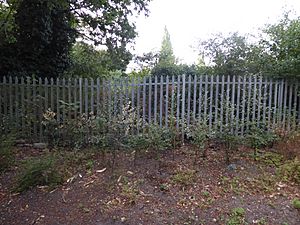Eaton Chalk Pit facts for kids
| Site of Special Scientific Interest | |

Eaton Chalk Pit is in an area which is closed to the public.
|
|
| Area of Search | Norfolk |
|---|---|
| Interest | Biological |
| Area | 0.16 hectares (0.40 acres) |
| Notification | 1986 |
| Location map | Magic Map |
Eaton Chalk Pit is a small, special natural area located just outside Norwich in Norfolk, England. It's known for its old chalk mines, which have become a very important home for bats. This site is protected because of its unique natural features.
Contents
Eaton Chalk Pit: A Special Home for Bats
A Protected Place for Nature
Eaton Chalk Pit is officially called a Site of Special Scientific Interest, or SSSI for short. An SSSI is a special area in the United Kingdom that is protected by law. These places are chosen because they have important wildlife, plants, or geological features. Eaton Chalk Pit was given this special status in 1986 because of the bats that live there. It covers about 0.16 hectares, which is a very small but important piece of land.
Why Bats Love Chalk Mines
The main reason Eaton Chalk Pit is so special is its old chalk mines. These mines are perfect places for bats to hibernate, which means they go into a deep sleep during the cold winter months. Mines offer a stable temperature and humidity, which bats need to survive hibernation. Up to 40 bats have been counted using these mines.
Different Kinds of Bats
Several types of bats make their home in the chalk mines at Eaton Chalk Pit. The main species found here include:
- Daubenton's bat: These bats are often called "water bats" because they like to hunt for insects over water.
- Natterer's bat: These bats are known for their very quiet echolocation calls, which they use to find food.
- Brown long-eared bat: These bats have very large ears, which help them hear insects flying in the dark.
Studying Bat Life
Scientists and conservationists have been watching and studying the bats at Eaton Chalk Pit for a long time. This research helps them understand how bats live, what they need to survive, and how to protect them. This study of how living things interact with their environment is called ecology. By monitoring the bats here, experts learn more about bat populations and how to help these amazing creatures thrive.
Visiting Eaton Chalk Pit
To protect the bats and their sensitive habitat, Eaton Chalk Pit is not open to the public. This helps make sure the bats are not disturbed, especially during their important hibernation period.

